Thank you, and I will!Nice AAR!
Keep the horde growing.
The Genghisid Imperial Family, A Golden Horde AAR [Divine Wind]
- Thread starter scholar
- Start date
-
We have updated our Community Code of Conduct. Please read through the new rules for the forum that are an integral part of Paradox Interactive’s User Agreement.
You are using an out of date browser. It may not display this or other websites correctly.
You should upgrade or use an alternative browser.
You should upgrade or use an alternative browser.
Mubarak Genghisid, Sultan of Gujarat, Grand Ancestor of the Gujarat Genghisids
Lived From 1492.4.22 - 1549.3.17
Ruled From 1534.11.1 - 1549.3.17
5-8-4

Mubarak was the Uncle of Sayid Ahmad Genghisid, that said, he was also younger than Sayid Ahmad by about five years. While alive he was a potential rival to Sayid Ahmad's succession, and later during the great war with the Habsburgs, Mubarak fought against them as a general even if he never had any particular talent for it. Nearing the end of Sayid's reign, the Gujarat Sultanate requested a Genghisid on their throne being the third to do so. That said the Gujarat Sultanate was much better than the previous nations that received a Genghisid. Khiva being an OPM and Al Haasa being a Shiite OPM.
Immediately following Mubarak's arrival in Gujarat he established an alliance with Deccan, which enjoyed close relations to the Genghisids inside the Golden Horde, as well as close marital ties. He also centralized the empire and established diplomatic contact with Oman and Haasa. Things didn't go smoothly, however. The Timurids immediately declared war upon Gujarat. Mubarak, however, was not alone. Delhi, Deccan, and Oman all sided with Gujarat. Following four months of meaningless bloodshed Mubarak made peace with the Timurids. In a surprising turn of events he even aligned with his attackers. He claimed aligning with the second most powerful Muslim Nation in the world would ward off attackers. Following this comment Delhi expressed it's disapproval towards Gujarat. However all the powers of the entire Islamic world were too terrified of him to make a move against him to remove him from his throne because of the reaction that occurred to the Timurids after they tried to remove him, and the fact that the Timurids are now backing him.
Things were not quiet for very long as Deccan would go to war with Delhi. Mubarak sided with Deccan against Delhi. While Gujarat made no permanent gains, they did manage to take Delhi itself and force the Sultanate to make peace with Deccan who was losing the war. After seven years of peace, Deccan went to war again, but this time with Ceylon. Gujarat would send it's navy and 12,000 troops down to the Island. While the island was being besieged, Mubarak died. He didn't live much longer than his nephew. He left everything to his second son, Muhammad. One wonders what will happen to the least powerful of the independent nations of India, but one hopes that Mubarak's legacy will be long lasting and that the Genghisids will lead them into everlasting glory.

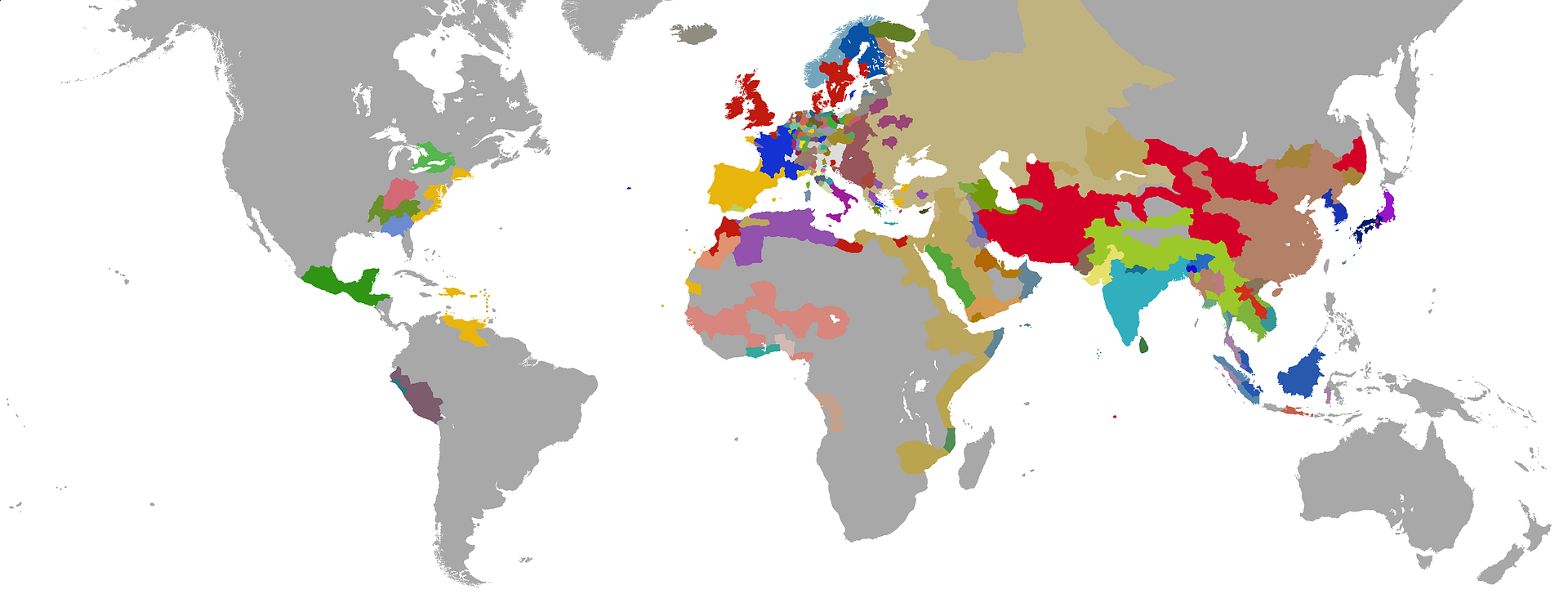
Lived From 1492.4.22 - 1549.3.17
Ruled From 1534.11.1 - 1549.3.17
5-8-4

Mubarak was the Uncle of Sayid Ahmad Genghisid, that said, he was also younger than Sayid Ahmad by about five years. While alive he was a potential rival to Sayid Ahmad's succession, and later during the great war with the Habsburgs, Mubarak fought against them as a general even if he never had any particular talent for it. Nearing the end of Sayid's reign, the Gujarat Sultanate requested a Genghisid on their throne being the third to do so. That said the Gujarat Sultanate was much better than the previous nations that received a Genghisid. Khiva being an OPM and Al Haasa being a Shiite OPM.
Immediately following Mubarak's arrival in Gujarat he established an alliance with Deccan, which enjoyed close relations to the Genghisids inside the Golden Horde, as well as close marital ties. He also centralized the empire and established diplomatic contact with Oman and Haasa. Things didn't go smoothly, however. The Timurids immediately declared war upon Gujarat. Mubarak, however, was not alone. Delhi, Deccan, and Oman all sided with Gujarat. Following four months of meaningless bloodshed Mubarak made peace with the Timurids. In a surprising turn of events he even aligned with his attackers. He claimed aligning with the second most powerful Muslim Nation in the world would ward off attackers. Following this comment Delhi expressed it's disapproval towards Gujarat. However all the powers of the entire Islamic world were too terrified of him to make a move against him to remove him from his throne because of the reaction that occurred to the Timurids after they tried to remove him, and the fact that the Timurids are now backing him.
Things were not quiet for very long as Deccan would go to war with Delhi. Mubarak sided with Deccan against Delhi. While Gujarat made no permanent gains, they did manage to take Delhi itself and force the Sultanate to make peace with Deccan who was losing the war. After seven years of peace, Deccan went to war again, but this time with Ceylon. Gujarat would send it's navy and 12,000 troops down to the Island. While the island was being besieged, Mubarak died. He didn't live much longer than his nephew. He left everything to his second son, Muhammad. One wonders what will happen to the least powerful of the independent nations of India, but one hopes that Mubarak's legacy will be long lasting and that the Genghisids will lead them into everlasting glory.


Arang Khan Genghisid, Khan of the Khivan Khanate
Lived From 1467.12.24 - 1549.4.19
Ruled From 1539.1.11 - 1549.4.19
4-3-4

Arang Khan was a very old man, perhaps too old for the burden of Khan when he arrived at Khiva. The Khivan Khanate had declared outright rebellion from the Timurid Empire just four years before Arang took his place as Khan. They were but one province utterly at the mercy of the Timurids who expanded from the Persian Gulf to the Sea of Japan. Nevertheless Arang Khan orchestrated several reforms and instuted an elite army of 4000 cavalry for the Khanate's defense. He also made many diplomatic inroads to Mahmud and his successor to try to get the Khagan and the Horde to invade the Timurids to allow the Khivan Khanate to have a border with a friendly force so they would not be standing alone in a sea of red.
This was just not to be, following eight years of independence under Genghisid Rule the Timurids attacked the Khivan Khanate, Arang abandoned the defense of the homeland and spread his forces thin across the lightly defended garrisons to the north and the south praying for intervention. Arang along with his son Abd'ullah Qara Beg Genghisid (8-4-7) won scores of victories against the Timurids who were busy also being at war with the Delhi Sultanate and the Celestial Empire of Ming. Intervention finally came with the conquest of three provinces with the Khagan of the Golden Horde unleashing armies upon the Timurid Empire far greater than anything Arang Kahn dreamed could be possible, for a time it looked as if things would be great, grand for the Khivan Khanate and victory was assured when 16,000 troops lay siege to Samarkand. This, however, was simply not meant to be.
The Timurid Khan personally lead the siege of Khiva with a force of 17,000 men with assorted cannons and infantry incorporated into the army. Within mere months the territory fell and Khiva was on the run. Arang Khan dared not commit even one single soldier to battle so each time a Timurid army came to attack him he fled with his 4000 men. Eventually with the loss of the motherland the Khivan Khanate was on the verge of bankruptcy when finally the Golden Horde gave subsidies. This was not enough, however, as the Timurids besieged all occupied territories. Just a month after his youngest brother's demise Arang Kahn died while leading his 4000 men to the Golden Horde without a home. On that very day the Timurids annexed the Khivan Khanate. Abd'ullah Qara Beg Genghisid was welcomed into the Horde by his cousin and was given control of the armies to the north of the Timurids. With Khiva gone the war no longer was needed and a peace was agreed between the two Empires.
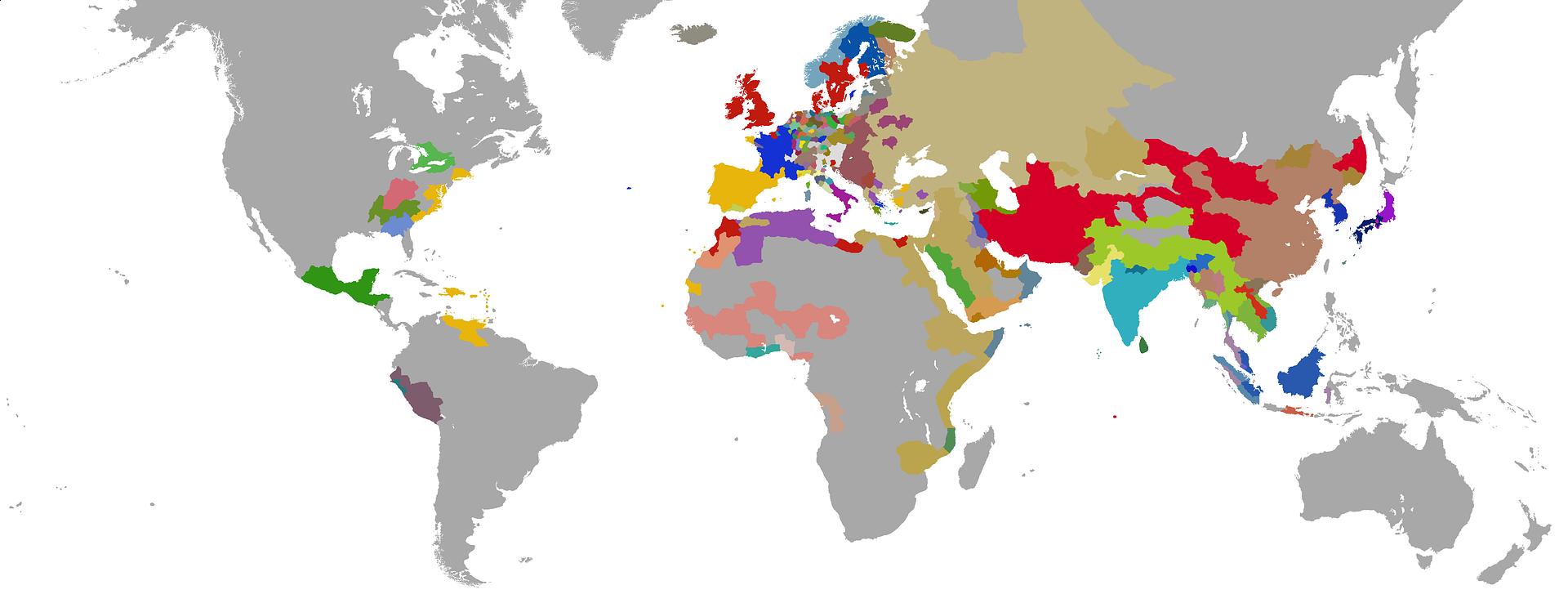
Lived From 1467.12.24 - 1549.4.19
Ruled From 1539.1.11 - 1549.4.19
4-3-4

Arang Khan was a very old man, perhaps too old for the burden of Khan when he arrived at Khiva. The Khivan Khanate had declared outright rebellion from the Timurid Empire just four years before Arang took his place as Khan. They were but one province utterly at the mercy of the Timurids who expanded from the Persian Gulf to the Sea of Japan. Nevertheless Arang Khan orchestrated several reforms and instuted an elite army of 4000 cavalry for the Khanate's defense. He also made many diplomatic inroads to Mahmud and his successor to try to get the Khagan and the Horde to invade the Timurids to allow the Khivan Khanate to have a border with a friendly force so they would not be standing alone in a sea of red.
This was just not to be, following eight years of independence under Genghisid Rule the Timurids attacked the Khivan Khanate, Arang abandoned the defense of the homeland and spread his forces thin across the lightly defended garrisons to the north and the south praying for intervention. Arang along with his son Abd'ullah Qara Beg Genghisid (8-4-7) won scores of victories against the Timurids who were busy also being at war with the Delhi Sultanate and the Celestial Empire of Ming. Intervention finally came with the conquest of three provinces with the Khagan of the Golden Horde unleashing armies upon the Timurid Empire far greater than anything Arang Kahn dreamed could be possible, for a time it looked as if things would be great, grand for the Khivan Khanate and victory was assured when 16,000 troops lay siege to Samarkand. This, however, was simply not meant to be.
The Timurid Khan personally lead the siege of Khiva with a force of 17,000 men with assorted cannons and infantry incorporated into the army. Within mere months the territory fell and Khiva was on the run. Arang Khan dared not commit even one single soldier to battle so each time a Timurid army came to attack him he fled with his 4000 men. Eventually with the loss of the motherland the Khivan Khanate was on the verge of bankruptcy when finally the Golden Horde gave subsidies. This was not enough, however, as the Timurids besieged all occupied territories. Just a month after his youngest brother's demise Arang Kahn died while leading his 4000 men to the Golden Horde without a home. On that very day the Timurids annexed the Khivan Khanate. Abd'ullah Qara Beg Genghisid was welcomed into the Horde by his cousin and was given control of the armies to the north of the Timurids. With Khiva gone the war no longer was needed and a peace was agreed between the two Empires.

Sulayman II Genghisid, Malik of Haasa City, Grand Ancestor to the Haasa Genghisids
Live From: 1477.11.22 - 1549.8.7
Ruled From: 1533.12.22 - 1549.8.7
7-4-4

Sulayman was one of Sayid Ahmad's uncles. He attained dominion over the city of Haasa after the city requested a Genghisid heir. Sulayman, who was a rival to the throne in the Khanate, welcomed the opportunity to get away from it all and rule in his own right. The main problem with this, however, was that the small city was unable to field a large army. Nor was it even compatible with his own faith. Sulayman was a devout Sunni who found the idea of hell being permanent very troubling. Nevertheless Sulayman was able to come to terms with it and establish himself.
Sulayman's reign was one of administrative reform, as he reorganized the entire system of government following his arrival. He also created a network of royal marriages, but otherwise practiced strict avoidance of military alliances. He did, however, remain on excellent terms with all of the surrounding powers, especially with Oman, who was the one nation Sulayman considered making an exception with. Things were going well until news reached Sulayman that his younger brother perished in Gujarat. He immediately extended diplomatic missions to his successor, as his brother had done for him.
Things did not get any better for him as his only other surviving brother, the Khan of Khiva, perished on the long journey home after having lost a war with the Timurids. Sulayman was not completely alone. He knew he did not have much time left and orchestrated the terms of succession leaving everything to his son and began to take great care in his upbringing. With the loss of one Genghisid nation already, if his son was not taught properly he would suffer the same fate. Sulayman would not live to see him properly brought up and died just four months after his brother Arang. His death left the future of Al Haasa shrouded in uncertainty. Time will tell if it will follow the path of Khiva.


Live From: 1477.11.22 - 1549.8.7
Ruled From: 1533.12.22 - 1549.8.7
7-4-4

Sulayman was one of Sayid Ahmad's uncles. He attained dominion over the city of Haasa after the city requested a Genghisid heir. Sulayman, who was a rival to the throne in the Khanate, welcomed the opportunity to get away from it all and rule in his own right. The main problem with this, however, was that the small city was unable to field a large army. Nor was it even compatible with his own faith. Sulayman was a devout Sunni who found the idea of hell being permanent very troubling. Nevertheless Sulayman was able to come to terms with it and establish himself.
Sulayman's reign was one of administrative reform, as he reorganized the entire system of government following his arrival. He also created a network of royal marriages, but otherwise practiced strict avoidance of military alliances. He did, however, remain on excellent terms with all of the surrounding powers, especially with Oman, who was the one nation Sulayman considered making an exception with. Things were going well until news reached Sulayman that his younger brother perished in Gujarat. He immediately extended diplomatic missions to his successor, as his brother had done for him.
Things did not get any better for him as his only other surviving brother, the Khan of Khiva, perished on the long journey home after having lost a war with the Timurids. Sulayman was not completely alone. He knew he did not have much time left and orchestrated the terms of succession leaving everything to his son and began to take great care in his upbringing. With the loss of one Genghisid nation already, if his son was not taught properly he would suffer the same fate. Sulayman would not live to see him properly brought up and died just four months after his brother Arang. His death left the future of Al Haasa shrouded in uncertainty. Time will tell if it will follow the path of Khiva.


Sayf ad-Din Genghisid, Sultan of Brunei
Lived From 1502.4.21 - 1564.2.12
Ruled From 1533.6.12 - 1564.2.12
8-4-8

Sayf was the third son of Sayid Ahmad Genghisid of the Golden Horde. Originally born Yusuf, he styled himself Sayf ad-Din upon being crowned as Sultan of the Brunei Sultanate. This was a rather remarkable turn of events because Brunei was one of the few Islamic nations in the world to actually have a very bad opinion of the Khagan and aligned themselves to the Timurids. Sayf would change the Sultanate's world forever once he attained the throne. Brunei had built it's entire foundations upon Chinese influence. Even the color of their banner, Yellow, came from the Chinese. Sayf immediately set out to exterminate any and all Chinese influence within the Sultanate as the Chinese had actually grown quite powerful by defeating the Timurids in two consecutive wars when no one else but the Golden Horde could do it. It was seen as a clear sign that change was needed lest their be Chinese sympathizers within his midst.
Apart from internal crusades against mostly unseen enemies, he also instituted a vast network of government reforms stabilizing the government which had been in relative tatters since he first arrived. For the next five years he waited patiently for his new Kingdom to stabilize enough for it to return to being the dominant power inside of the region. This, however, would not go as planned. Ten years into Sayf's reign he was brutally assaulted by the Sultanate of Bali and the Sultanate of Pattani who formed an unholy alliance against the Sultanate. Sayf immediately took arms to protect Brunei's hegenomy, but his sole ally, Aceh, refused him aid. This left Sayf alone against two nations. Still, things were not as bad as they looked. Pattani immediately took over territories and so did Bali but Sayf kept Borneo free from their grasp with his army of ships sinking any army that dared an invasion by sea.
While Borneo could not be invaded, Sayf could not mount a rescue operation for his overseas territories. When Aceh made one final act of betrayal by joining Bali and Pattani in the war, Brunei ceded all overseas provinces. This made Sayf an immensely unpopular man. With the failure in Khiva, Tripoli, and Qara Koyunlu, the lackluster results inside Gujarat, and the nothingness occurring inside of Haasa it seemed as if all Genghisid offshoots were total failures. Brunei, who was never on good relations with the Horde, turned against Sayf. Sayf put down several pretenders who wanted to overthrow him, however a Vietnamese man who championed a return to their former glory took control of a sizable army. Sayf was forced to flee continuously before finally being captured and executed, along with his son, at Sabah. Again, another Genghisid family meets nothing but tragedy at the hands of their own people.
However it soon became apparent that Sayf was a superb administrator and an excellent military commander. The Trans that succeeded the Genghisids were utter incompetent failures who could not match Sayf's grandier. Before even the decade was through Brunei realized that Sayf had not failed them, but rather saved them. And that they rewarded their savior with pain, death, and regicide. The Trans would make Brunei burn. In just one war they were stripped down to their capital, never to rise again. Even now the Brunei populous prays for Sayf's soul and begs forgiveness from him. Only time will tell if their prayers will ever be answered and another Genghisid comes to Brunei.

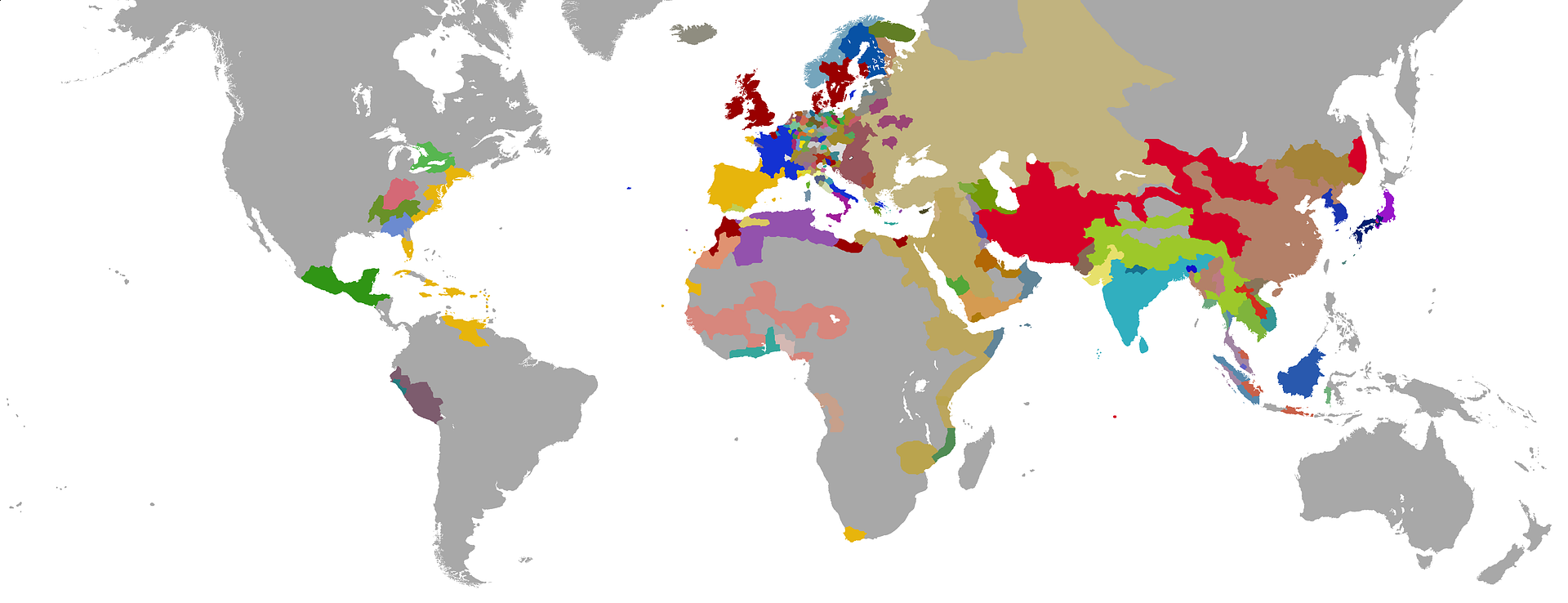
Lived From 1502.4.21 - 1564.2.12
Ruled From 1533.6.12 - 1564.2.12
8-4-8

Sayf was the third son of Sayid Ahmad Genghisid of the Golden Horde. Originally born Yusuf, he styled himself Sayf ad-Din upon being crowned as Sultan of the Brunei Sultanate. This was a rather remarkable turn of events because Brunei was one of the few Islamic nations in the world to actually have a very bad opinion of the Khagan and aligned themselves to the Timurids. Sayf would change the Sultanate's world forever once he attained the throne. Brunei had built it's entire foundations upon Chinese influence. Even the color of their banner, Yellow, came from the Chinese. Sayf immediately set out to exterminate any and all Chinese influence within the Sultanate as the Chinese had actually grown quite powerful by defeating the Timurids in two consecutive wars when no one else but the Golden Horde could do it. It was seen as a clear sign that change was needed lest their be Chinese sympathizers within his midst.
Apart from internal crusades against mostly unseen enemies, he also instituted a vast network of government reforms stabilizing the government which had been in relative tatters since he first arrived. For the next five years he waited patiently for his new Kingdom to stabilize enough for it to return to being the dominant power inside of the region. This, however, would not go as planned. Ten years into Sayf's reign he was brutally assaulted by the Sultanate of Bali and the Sultanate of Pattani who formed an unholy alliance against the Sultanate. Sayf immediately took arms to protect Brunei's hegenomy, but his sole ally, Aceh, refused him aid. This left Sayf alone against two nations. Still, things were not as bad as they looked. Pattani immediately took over territories and so did Bali but Sayf kept Borneo free from their grasp with his army of ships sinking any army that dared an invasion by sea.
While Borneo could not be invaded, Sayf could not mount a rescue operation for his overseas territories. When Aceh made one final act of betrayal by joining Bali and Pattani in the war, Brunei ceded all overseas provinces. This made Sayf an immensely unpopular man. With the failure in Khiva, Tripoli, and Qara Koyunlu, the lackluster results inside Gujarat, and the nothingness occurring inside of Haasa it seemed as if all Genghisid offshoots were total failures. Brunei, who was never on good relations with the Horde, turned against Sayf. Sayf put down several pretenders who wanted to overthrow him, however a Vietnamese man who championed a return to their former glory took control of a sizable army. Sayf was forced to flee continuously before finally being captured and executed, along with his son, at Sabah. Again, another Genghisid family meets nothing but tragedy at the hands of their own people.
However it soon became apparent that Sayf was a superb administrator and an excellent military commander. The Trans that succeeded the Genghisids were utter incompetent failures who could not match Sayf's grandier. Before even the decade was through Brunei realized that Sayf had not failed them, but rather saved them. And that they rewarded their savior with pain, death, and regicide. The Trans would make Brunei burn. In just one war they were stripped down to their capital, never to rise again. Even now the Brunei populous prays for Sayf's soul and begs forgiveness from him. Only time will tell if their prayers will ever be answered and another Genghisid comes to Brunei.


Muhammad II Genghisid, Sultan of Gujarat
Lived From: 1516.4.22 - 1572.5.11
Ruled From: 1549.3.17 - 1572.5.11
5-7-3
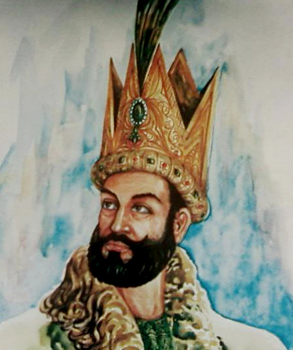
When Mubarak died, Muhammad was left on the throne in charge of a relatively minor nation surrounded by Giants. Deccan and Delhi being the only neighbors and the Timurids being just three provinces away it seemed as though Muhammad succeeded to a throne that was doomed never to expand and only if it was lucky it would keep it's own minor possessions. Though this was not set in stone, however. The island of Ceylon was resisting against Deccan rule and Deccan requested Gujarat aid in putting down their feeble and weak minded rebellion. When Muhammad became Sultan half the Island was under Deccan hands, however he refused to allow the other half to fall into Deccan hands. 12,000 Gujarat soldiers poured down to the southern half of the Island, defeating the 5000 defenders and putting the Ceylon capital under siege. When Ceylon was fully occupied Deccan was forced only to receive one province instead of two.
Muhammad then found himself engaging in marital arrangements with all the major powers surrounding him, and even developing a strong alliance with the Timurid Horde. Muhammad always declared wars on small nations in the hope of attaining some sort of expansion, but whenever he was close to success his manpower reserves would dwindle and war exhaustion would rise beyond imagining. This frustrating turn left Muhammad with few actual gains. Muhammad in the end was able to vassalize Aceh, however who was located on the Island of Sumatra. This short lived success would not last for long. While this was happening, Maldives conquered the remaining half of Ceylon during the 5 month truce. Deccan quickly went to war with them over the half of the island, dragging along Muhammad along with them.
The Maldives, however, were not alone. They had an ally, Pattani, who in turn had an alliance with Delhi who quickly took over the war as their own personal war of revenge against the Deccan Sultanate that had so defeated them a few years prior. As Muhammad was busy defending the northern territories Deccan quickly conquered and annexed the Maldives and from there made a great push forward. Delhi, however, was not totally interested inside Deccan as they looked to crush Gujarat and knock them out of the war first. In just one year Delhi took over three territories of the Gujarat Sultanate. Muhammad was busy besieging Delhi hoping that it's capture deep in enemy territory would grant himself a truce. When he did capture the great city he found that Gujarat was forced to empty half of it's treasury and release it's vassal in the form of Aceh.
Sadly, as Muhammad was predicting a defeat and moved for peace as quickly as possible, fate moved in the opposite direction as Deccan won score after score of victories against the Sultanate. Eventually they overrun Delhi completely and inflicted a costly peace on them. Had Gujarat stayed in the war the small nation may have expanded. Instead Muhammad had only been able to secure it's continued survival. Though some would argue it was the right thing as Gujarat was half conquered the other half may have fell before Deccan won the war leaving Gujarat worse off than ever before.
Delhi would know no peace as it got into a war with the celestial empire of Ming. Ming's armies would reach even the border of Gujarat and once again Delhi knew a crushing defeat. It was forced to release so many nations that it's former Empire became a patchwork entity of isolated areas of nominal Delhi control and new sultanates and emirates that sprung up across the Sultanate. With just two wars Delhi was crushed and with it crushed that leaved only Deccan in a position to attain hegemony inside of India, barring the Timurids and Chinese didn't invade in droves. With Deccan as Hegemon, Gujarat soon became their closest ally. Muhammad had succeeded in becoming the second most influential empire in all of India. They used that influence to free Sind from the Mamluks and engage in alliances with the new nations, still struggling with their new found freedom. Muhammad would not live to see Gujarat capitalize on the fall of Delhi, but he laid the foundations to make sure that it succeeded. He was succeeded by his son, Zafar.


Lived From: 1516.4.22 - 1572.5.11
Ruled From: 1549.3.17 - 1572.5.11
5-7-3

When Mubarak died, Muhammad was left on the throne in charge of a relatively minor nation surrounded by Giants. Deccan and Delhi being the only neighbors and the Timurids being just three provinces away it seemed as though Muhammad succeeded to a throne that was doomed never to expand and only if it was lucky it would keep it's own minor possessions. Though this was not set in stone, however. The island of Ceylon was resisting against Deccan rule and Deccan requested Gujarat aid in putting down their feeble and weak minded rebellion. When Muhammad became Sultan half the Island was under Deccan hands, however he refused to allow the other half to fall into Deccan hands. 12,000 Gujarat soldiers poured down to the southern half of the Island, defeating the 5000 defenders and putting the Ceylon capital under siege. When Ceylon was fully occupied Deccan was forced only to receive one province instead of two.
Muhammad then found himself engaging in marital arrangements with all the major powers surrounding him, and even developing a strong alliance with the Timurid Horde. Muhammad always declared wars on small nations in the hope of attaining some sort of expansion, but whenever he was close to success his manpower reserves would dwindle and war exhaustion would rise beyond imagining. This frustrating turn left Muhammad with few actual gains. Muhammad in the end was able to vassalize Aceh, however who was located on the Island of Sumatra. This short lived success would not last for long. While this was happening, Maldives conquered the remaining half of Ceylon during the 5 month truce. Deccan quickly went to war with them over the half of the island, dragging along Muhammad along with them.
The Maldives, however, were not alone. They had an ally, Pattani, who in turn had an alliance with Delhi who quickly took over the war as their own personal war of revenge against the Deccan Sultanate that had so defeated them a few years prior. As Muhammad was busy defending the northern territories Deccan quickly conquered and annexed the Maldives and from there made a great push forward. Delhi, however, was not totally interested inside Deccan as they looked to crush Gujarat and knock them out of the war first. In just one year Delhi took over three territories of the Gujarat Sultanate. Muhammad was busy besieging Delhi hoping that it's capture deep in enemy territory would grant himself a truce. When he did capture the great city he found that Gujarat was forced to empty half of it's treasury and release it's vassal in the form of Aceh.
Sadly, as Muhammad was predicting a defeat and moved for peace as quickly as possible, fate moved in the opposite direction as Deccan won score after score of victories against the Sultanate. Eventually they overrun Delhi completely and inflicted a costly peace on them. Had Gujarat stayed in the war the small nation may have expanded. Instead Muhammad had only been able to secure it's continued survival. Though some would argue it was the right thing as Gujarat was half conquered the other half may have fell before Deccan won the war leaving Gujarat worse off than ever before.
Delhi would know no peace as it got into a war with the celestial empire of Ming. Ming's armies would reach even the border of Gujarat and once again Delhi knew a crushing defeat. It was forced to release so many nations that it's former Empire became a patchwork entity of isolated areas of nominal Delhi control and new sultanates and emirates that sprung up across the Sultanate. With just two wars Delhi was crushed and with it crushed that leaved only Deccan in a position to attain hegemony inside of India, barring the Timurids and Chinese didn't invade in droves. With Deccan as Hegemon, Gujarat soon became their closest ally. Muhammad had succeeded in becoming the second most influential empire in all of India. They used that influence to free Sind from the Mamluks and engage in alliances with the new nations, still struggling with their new found freedom. Muhammad would not live to see Gujarat capitalize on the fall of Delhi, but he laid the foundations to make sure that it succeeded. He was succeeded by his son, Zafar.


Karim Berdi Genghisid, Khagan of the Golden Horde
Lived From: 1508.3.5 - 1573.3.30
Ruled From: 1542.1.20 - 1573.3.30
4-5-4

Karim Berdi was born to Sayid Ahmad Genghisid, the greatest Khagan to have lived in the contemporary era for his saving of the collapsing Golden Horde and expanding the Genghisid bloodline to four nations, two of which continued to carry it during the time Karim Berdi passed on the role of Khagan to his son. Karim Berdi's reign by comparison was pleasantly dull. There were a total of four wars during his thirty-one year reign and none against the same enemy. Karim Berdi also forged a great many alliances with the people out among the world in terms of marriage and bloodlines. However, sadly, he would never experience the same boon that his father had achieved by expanding the family to the world. In fact, he could not even get a single family to receive a Genghisid. This was not entirely his fault, however, for no lines died out during his reign.
Four years into his reign, Karim Berdi received word that his great-uncle was under attack by the Timurids. Karim Berdi did immediately declare war against the Timurids, but he was unable to get his desired results from the conflict. Three groups of 16,000 men descended upon the Timurid Empire but their gains were minimal and Samarkand resisted capture for so very long a time. When Khiva was lost it's only territory, Karim Berdi ordered his troops to charge the city walls in the hope that they would defeat the city, but it was to no avail. The four thousand infantry could not successfully breach the walls in time. As news reached Karim Berdi that his uncle had perished on the long march home, he also heard that the Timurids had annexed the Khivan khanate. With no point left in the war, a quick peace was arranged in which the Horde became the "winners" despite the loss of Khiva.
Eventually, Karim Berdi would get into a war with the Byzantines over their remaining holdings on the Balkans and Anatolia. The territories were quickly occupied, but they drew in the Spanish. After fighting a three year war with the Spanish forces, Karim Berdi sent an expedition through the Mamluks into Byzantium holdings inside Africa. For some reason England did agree to allow the troops to pass through their lands. As the Khagan's forces ravaged through Africa the Byzantines agreed to a peace where they would cede everything to the Khagan apart from Rhodes and their new home in Africa. This left the Spanish forces.
As Spain continued to send in troops, the Horde contemplated bringing in an ally to support them. A request was sent to the Mamluks to declare war upon the Habsburgs in Spain for the sake of Islam and their Alliance. It was a rather big surprise that the Mamluks not only refused the request, but broke off all ties with their neighbor to the north. The Horde was too busy fighting the Spanish and instead went for a rebel approach as was would never end officially their way. Karim Berdi unleashed patriot rebels inside the occupied Spanish territory. In two years the only territories Spain had inside Asia revolted and joined the Golden Horde. After two more years a white peace was arranged between Spain and the Horde. Officially, neither side gained or lost anything from the conflict, but unofficially it signaled the end of Spanish interference in the affairs of Asia, at least for now.
As time passed, Karim Berdi became very peaceful and endorsed the arts. He became known widely as a pleasant man. Ulug Muhammad, Karim Berdi's son, was taught in all the proper ways to rule and govern. There was, however, one last conflict left in Karim Berdi's reign as Khagan. That would be the war with the Lithuanian Habsburgs. Upon attaining the throne of Lithuania the Habsburgs overtly insulted the Khagan and everything he stood for. This was the first time the habsburgs initiated hostilities against the Genghisids in over 60 years. It was something Karim Berdi would not let pass.
Immediately hordes of Russians, Tartars, and other forces descended upon the fractured Lithuanian Empire. Their Habsburg King had expected Hungary, Prussia, Spain, Norway, Great Britain, and the other Habsburgs to join in the fight against the Sunni menace. They were wrong. Spain was uninterested with the Horde and viewed their assault on Lithuania as justified. Norway and Great Britain offered their sympathies, but ultimately did not support them. Prussia and Hungary were terrified of the Horde and would not go to war with it alone, or even with each other. They saw themselves as the buffers to the Sunnis to The Christian west, if they lost the possibility of everything falling was very real as the border would no longer be Hungary, but the Holy Roman Empire, the very seat of Christianity apart from Rome. All viewed Lithuania's actions as suicidal and doomed the nation to fall.
That is not to say, however, that Lithuania did not gain allies in the conflict. The one province minor of Barrois backed Lithuania and the three province minor of Finland also joined the fray. Why these two backed Lithuania is beyond even the wisest of historians. A single army took Finland's capital in one month. Peace was arranged quickly. The Horde's war was with Lithuania. And that war was going rather well. All of Lithuania was overrun. The nation, however, remained too large to annex outright. So, Karim Berdi took four of their provinces and left the Lithuanians with just two, not connected, provinces to rule. With this last war being a total success, Karim Berdi passed away leaving everything to his son, who was still a bit too young to rule on his own.

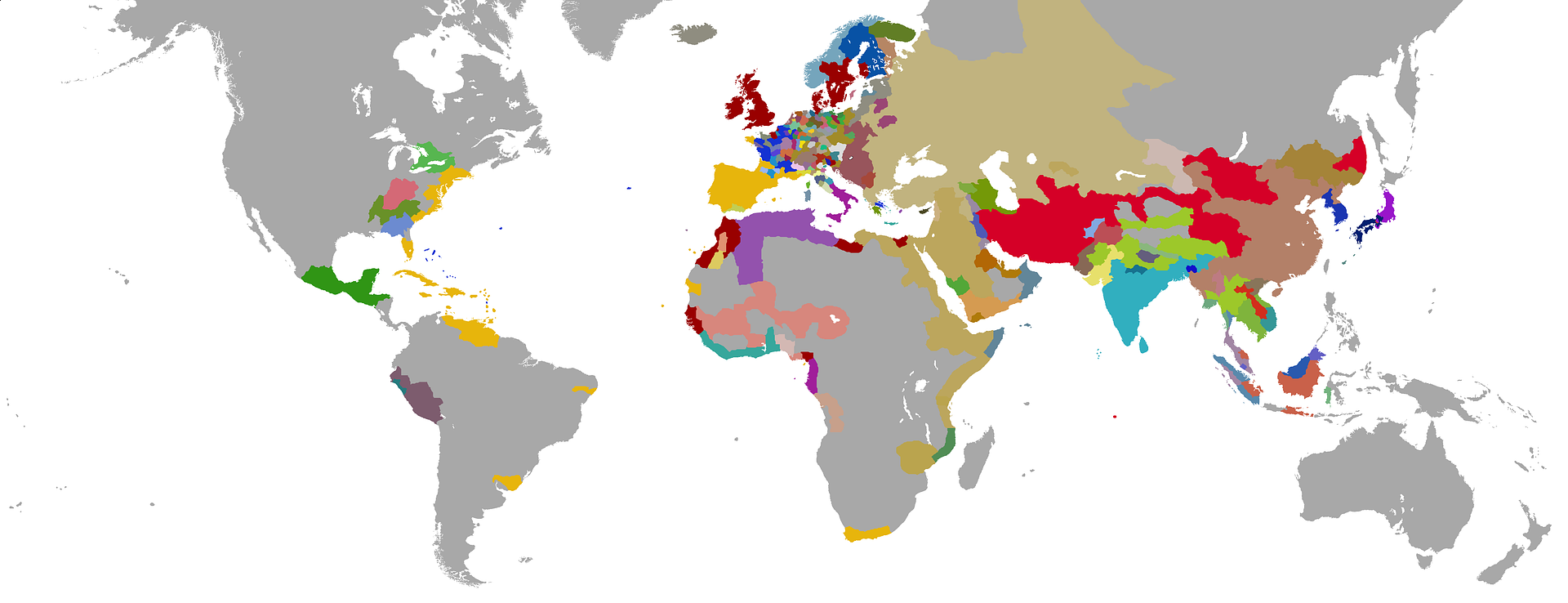
Lived From: 1508.3.5 - 1573.3.30
Ruled From: 1542.1.20 - 1573.3.30
4-5-4

Karim Berdi was born to Sayid Ahmad Genghisid, the greatest Khagan to have lived in the contemporary era for his saving of the collapsing Golden Horde and expanding the Genghisid bloodline to four nations, two of which continued to carry it during the time Karim Berdi passed on the role of Khagan to his son. Karim Berdi's reign by comparison was pleasantly dull. There were a total of four wars during his thirty-one year reign and none against the same enemy. Karim Berdi also forged a great many alliances with the people out among the world in terms of marriage and bloodlines. However, sadly, he would never experience the same boon that his father had achieved by expanding the family to the world. In fact, he could not even get a single family to receive a Genghisid. This was not entirely his fault, however, for no lines died out during his reign.
Four years into his reign, Karim Berdi received word that his great-uncle was under attack by the Timurids. Karim Berdi did immediately declare war against the Timurids, but he was unable to get his desired results from the conflict. Three groups of 16,000 men descended upon the Timurid Empire but their gains were minimal and Samarkand resisted capture for so very long a time. When Khiva was lost it's only territory, Karim Berdi ordered his troops to charge the city walls in the hope that they would defeat the city, but it was to no avail. The four thousand infantry could not successfully breach the walls in time. As news reached Karim Berdi that his uncle had perished on the long march home, he also heard that the Timurids had annexed the Khivan khanate. With no point left in the war, a quick peace was arranged in which the Horde became the "winners" despite the loss of Khiva.
Eventually, Karim Berdi would get into a war with the Byzantines over their remaining holdings on the Balkans and Anatolia. The territories were quickly occupied, but they drew in the Spanish. After fighting a three year war with the Spanish forces, Karim Berdi sent an expedition through the Mamluks into Byzantium holdings inside Africa. For some reason England did agree to allow the troops to pass through their lands. As the Khagan's forces ravaged through Africa the Byzantines agreed to a peace where they would cede everything to the Khagan apart from Rhodes and their new home in Africa. This left the Spanish forces.
As Spain continued to send in troops, the Horde contemplated bringing in an ally to support them. A request was sent to the Mamluks to declare war upon the Habsburgs in Spain for the sake of Islam and their Alliance. It was a rather big surprise that the Mamluks not only refused the request, but broke off all ties with their neighbor to the north. The Horde was too busy fighting the Spanish and instead went for a rebel approach as was would never end officially their way. Karim Berdi unleashed patriot rebels inside the occupied Spanish territory. In two years the only territories Spain had inside Asia revolted and joined the Golden Horde. After two more years a white peace was arranged between Spain and the Horde. Officially, neither side gained or lost anything from the conflict, but unofficially it signaled the end of Spanish interference in the affairs of Asia, at least for now.
As time passed, Karim Berdi became very peaceful and endorsed the arts. He became known widely as a pleasant man. Ulug Muhammad, Karim Berdi's son, was taught in all the proper ways to rule and govern. There was, however, one last conflict left in Karim Berdi's reign as Khagan. That would be the war with the Lithuanian Habsburgs. Upon attaining the throne of Lithuania the Habsburgs overtly insulted the Khagan and everything he stood for. This was the first time the habsburgs initiated hostilities against the Genghisids in over 60 years. It was something Karim Berdi would not let pass.
Immediately hordes of Russians, Tartars, and other forces descended upon the fractured Lithuanian Empire. Their Habsburg King had expected Hungary, Prussia, Spain, Norway, Great Britain, and the other Habsburgs to join in the fight against the Sunni menace. They were wrong. Spain was uninterested with the Horde and viewed their assault on Lithuania as justified. Norway and Great Britain offered their sympathies, but ultimately did not support them. Prussia and Hungary were terrified of the Horde and would not go to war with it alone, or even with each other. They saw themselves as the buffers to the Sunnis to The Christian west, if they lost the possibility of everything falling was very real as the border would no longer be Hungary, but the Holy Roman Empire, the very seat of Christianity apart from Rome. All viewed Lithuania's actions as suicidal and doomed the nation to fall.
That is not to say, however, that Lithuania did not gain allies in the conflict. The one province minor of Barrois backed Lithuania and the three province minor of Finland also joined the fray. Why these two backed Lithuania is beyond even the wisest of historians. A single army took Finland's capital in one month. Peace was arranged quickly. The Horde's war was with Lithuania. And that war was going rather well. All of Lithuania was overrun. The nation, however, remained too large to annex outright. So, Karim Berdi took four of their provinces and left the Lithuanians with just two, not connected, provinces to rule. With this last war being a total success, Karim Berdi passed away leaving everything to his son, who was still a bit too young to rule on his own.


How do you actually play this? Do you play each ruler yourself or do you keep a close eye on what the AI does with the Genghisids?
I keep a close eye on them. It's not as difficult as it looks because if you don't have enough to write about you can just save and then move over to the nation you're writing about and check it's history for the monarch in question. As long as it doesn't say He's a drunk or something along those lines you'll have enough to fill a few paragraphs. My main game is with the Golden Horde, it's why their entries are much more detailed. The rest is just observing and making a good story out of it. Thank you for reading!How do you actually play this? Do you play each ruler yourself or do you keep a close eye on what the AI does with the Genghisids?
Zafar III Genghisid, Sultan of Gujarat
Lived From: 1557.5.11 - 1593.3.19
Ruled From: 1572.5.11 - 1593.3.19
5-7-8

When Zafar became Sultan he was almost put under a regency council for being just at the right age of leadership. As Sultan Zafar strengthened relations with Deccan and the Timurids as Delhi continued to fall. One of the first acts Zafar did was declare war upon the nation of Rajputa to his north, which had just declared outright independence from the ailing Delhi Sultanate. With his victory over that state, Zafar became the first man in over a century to expand the Gujarat Sultanate. It was a modest expansion, but it was a clear sign of progress.
Delhi, however, was not finished showing it's resolve in more ways than one. Delhi had forced Bihar into becoming a vassal, annexed half of and vassalized Nepal, as well as taking out a large portion of Punjab and doing the same. Also, it's territories inside of southeast Asia showed no signs of collapse, in fact they remain a stable bastion of Delhi rule despite lacking a connection by sea and by land. Also, Delhi was no where near a powerless nation, retaining it's position as most powerful nation after only slightly falling behind Deccan. This was something that Deccan would not stand for. It liked it's new position as number one and did not wish to lose it.
Deccan started a war with Delhi over a boundary dispute and immediately requested the aid of Gujarat in taking down Delhi. Zafar, eager to keep his position secure and even expand his empire, agreed to declare war upon Delhi immediately following Deccan's declaration. As troops poured over the boundaries at either side. Gujarat was able to maintain it's borders but whenever it captured a territory a very large army would always force Zafar's troops back into friendly territory. After four years of conflict the war ended without a single gain made by either side. Instead of Deccan restoring it's position as new found Hegemon, it found itself in dual ownership of the Indian Subcontinent with Delhi. Also, Zafar's reign, despite being highly successful, would be terribly short. Just two years after the conflict was resolved, Zafar passed away leaving everything to his brother, Ahmad.

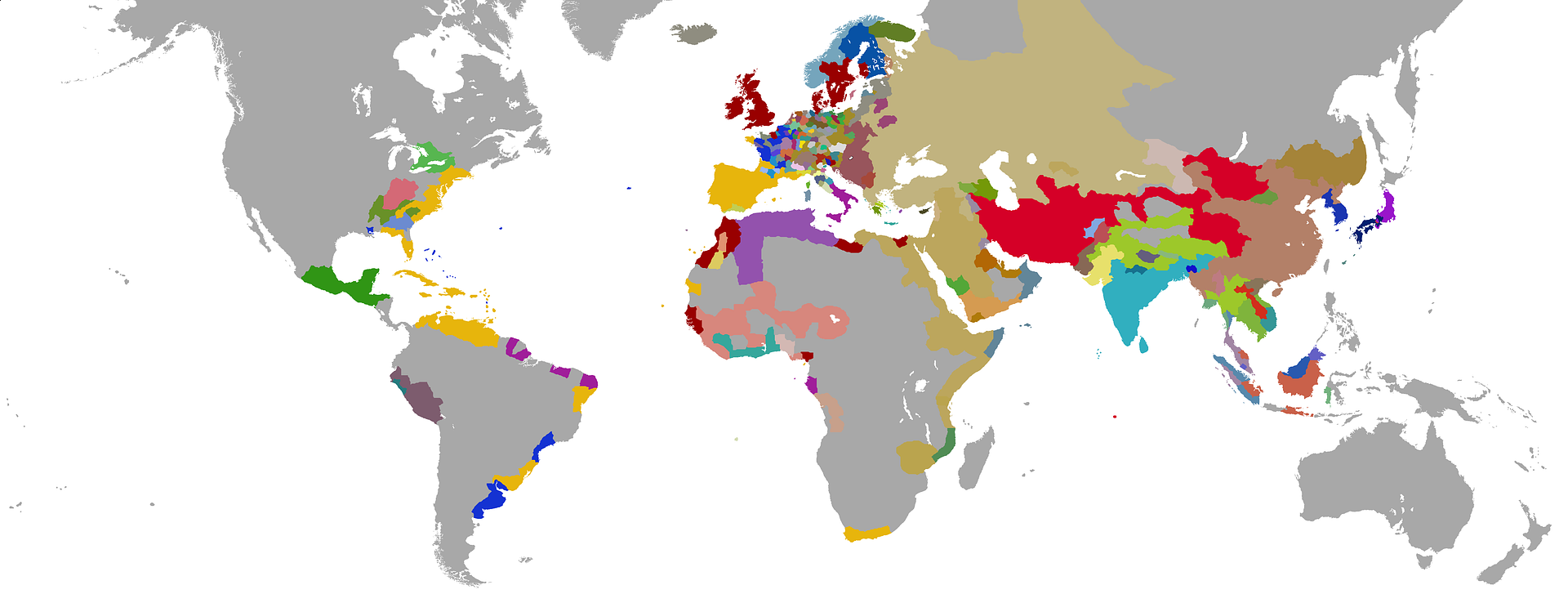
Lived From: 1557.5.11 - 1593.3.19
Ruled From: 1572.5.11 - 1593.3.19
5-7-8

When Zafar became Sultan he was almost put under a regency council for being just at the right age of leadership. As Sultan Zafar strengthened relations with Deccan and the Timurids as Delhi continued to fall. One of the first acts Zafar did was declare war upon the nation of Rajputa to his north, which had just declared outright independence from the ailing Delhi Sultanate. With his victory over that state, Zafar became the first man in over a century to expand the Gujarat Sultanate. It was a modest expansion, but it was a clear sign of progress.
Delhi, however, was not finished showing it's resolve in more ways than one. Delhi had forced Bihar into becoming a vassal, annexed half of and vassalized Nepal, as well as taking out a large portion of Punjab and doing the same. Also, it's territories inside of southeast Asia showed no signs of collapse, in fact they remain a stable bastion of Delhi rule despite lacking a connection by sea and by land. Also, Delhi was no where near a powerless nation, retaining it's position as most powerful nation after only slightly falling behind Deccan. This was something that Deccan would not stand for. It liked it's new position as number one and did not wish to lose it.
Deccan started a war with Delhi over a boundary dispute and immediately requested the aid of Gujarat in taking down Delhi. Zafar, eager to keep his position secure and even expand his empire, agreed to declare war upon Delhi immediately following Deccan's declaration. As troops poured over the boundaries at either side. Gujarat was able to maintain it's borders but whenever it captured a territory a very large army would always force Zafar's troops back into friendly territory. After four years of conflict the war ended without a single gain made by either side. Instead of Deccan restoring it's position as new found Hegemon, it found itself in dual ownership of the Indian Subcontinent with Delhi. Also, Zafar's reign, despite being highly successful, would be terribly short. Just two years after the conflict was resolved, Zafar passed away leaving everything to his brother, Ahmad.


The Passing of Two Centuries
1399-1600
The World has changed, with old eyes and familiar faces, the world itself is on fire.
Northern Europe:
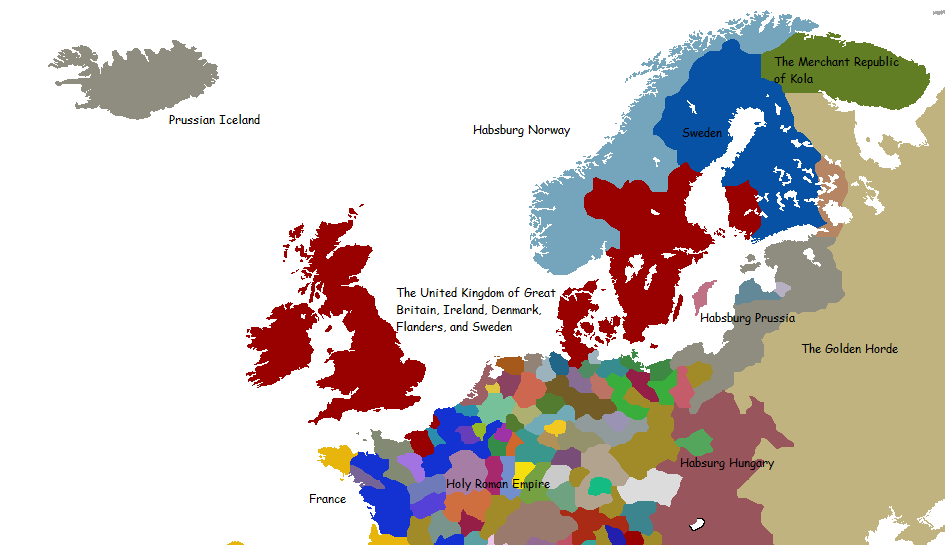
South West Europe:
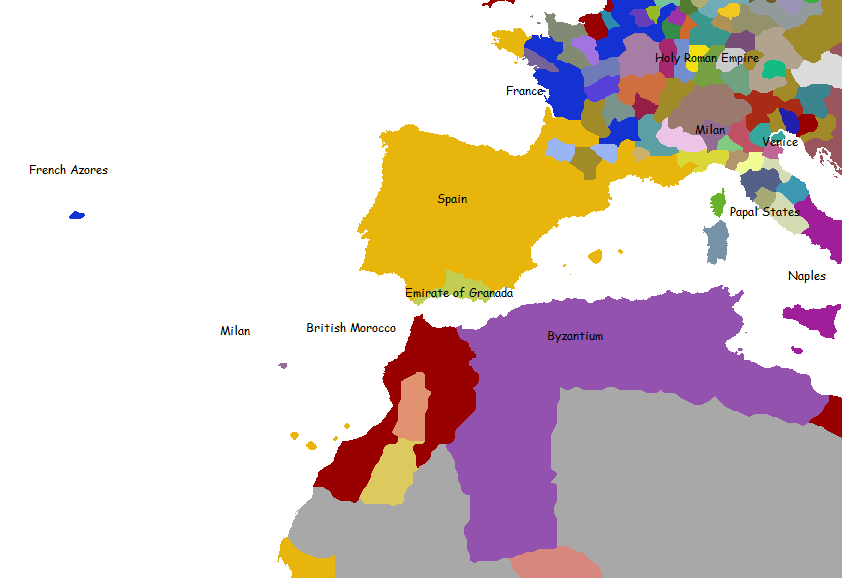
South East Europe:
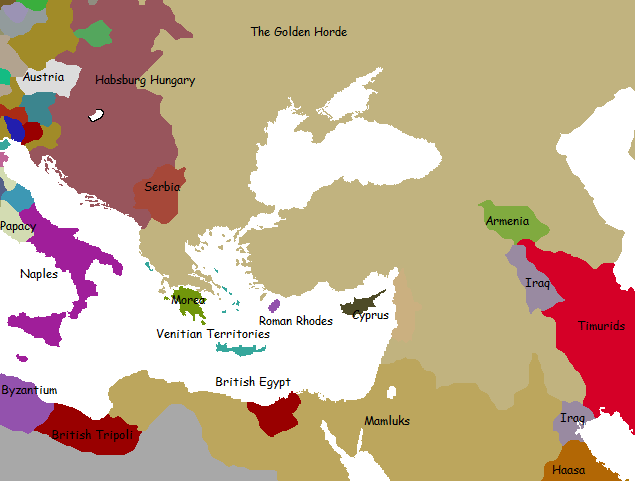
North East Africa:
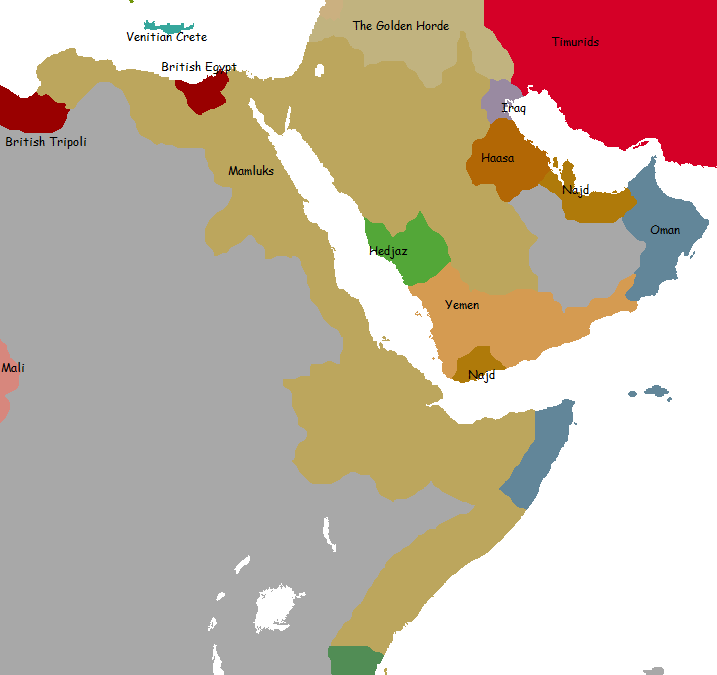
North West Africa:
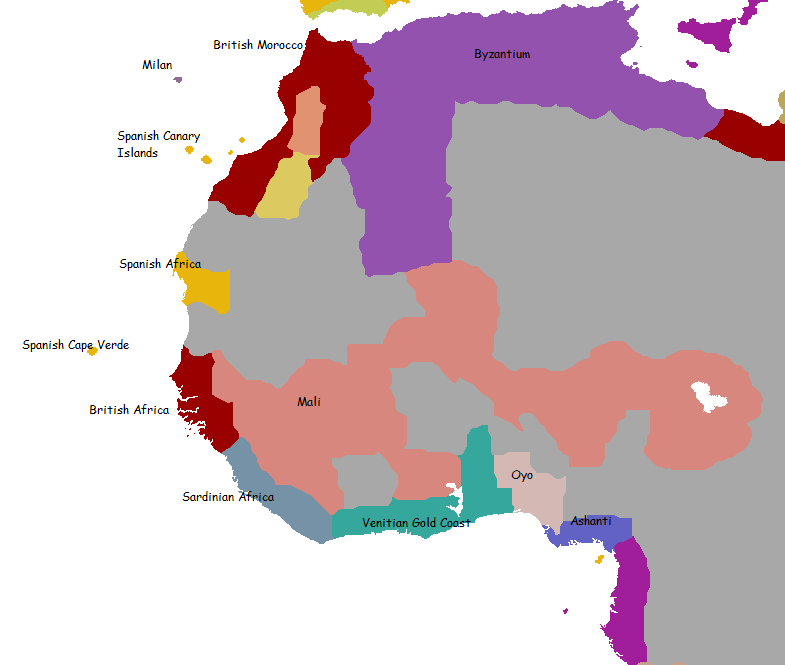
South Africa:
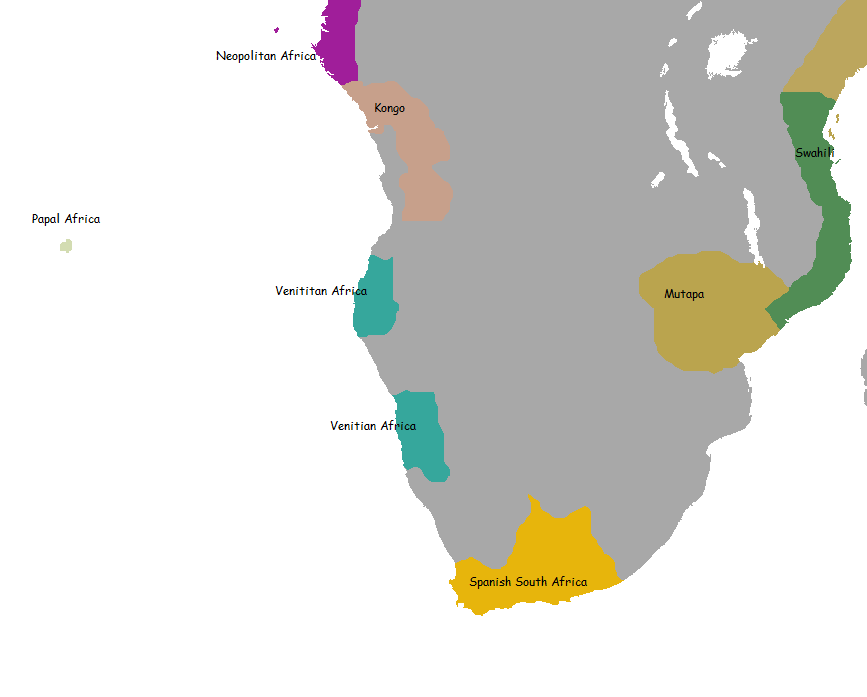
India:

South East Asia:
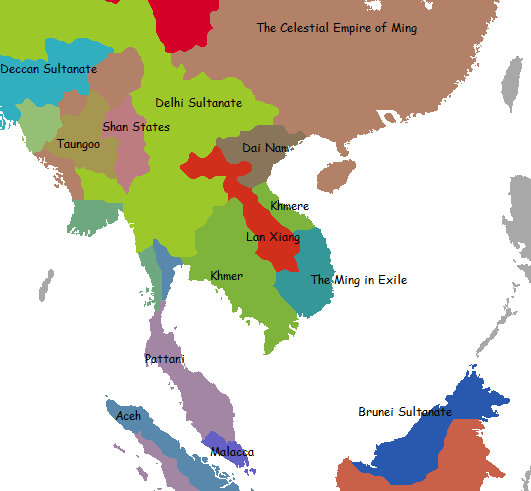
North East Asia:
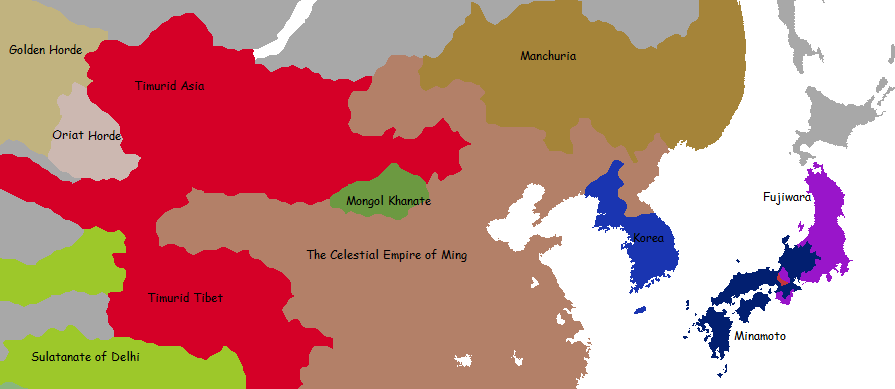
North America:
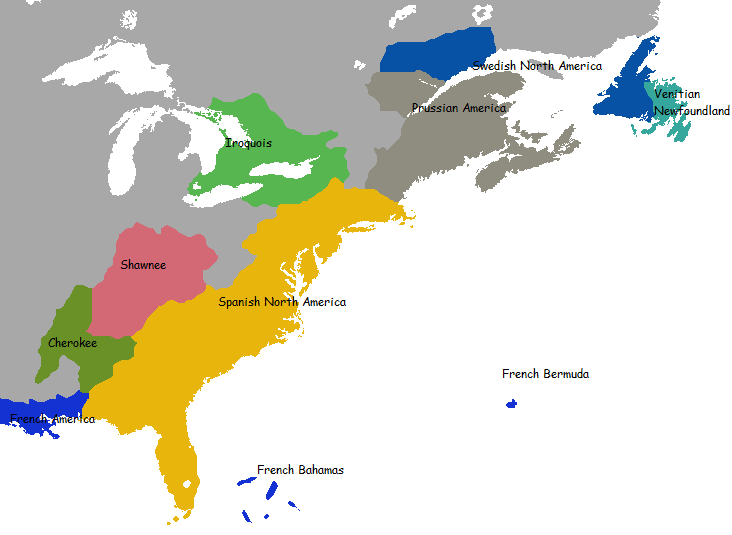
Caribbean:
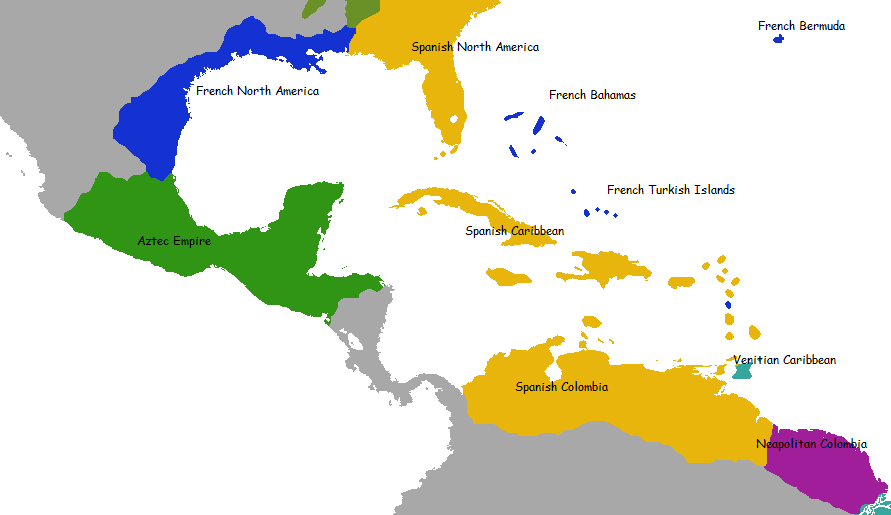
South America:
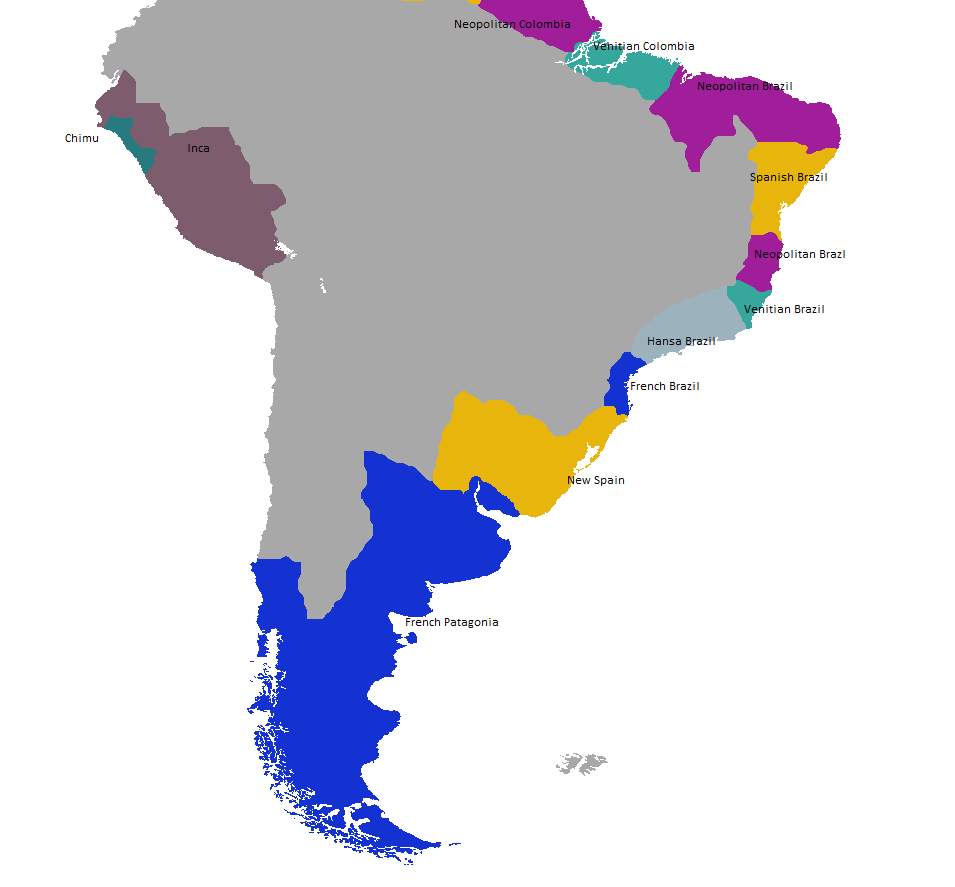
1399-1600
The World has changed, with old eyes and familiar faces, the world itself is on fire.
Northern Europe:

South West Europe:

South East Europe:

North East Africa:

North West Africa:

South Africa:

India:

South East Asia:

North East Asia:

North America:

Caribbean:

South America:

Last edited:
Thank you everyone for 3000 views! For the next few updates I will be giving details on all independent nations by sections. Depending on how this goes I'll do another universal update in 50 years, 100 years, or another 200 years.
This is the first AAR I've actually completely read. The updates on the various dynasty lines are very interesting; not often do you get to see the world from the perspective of a fragile and doomed nation. Also, The resurgent Byzantines, the ever resilient Delhi, the Habsburg Europe, the fearsome and ever-meddling Timurids make for an intersting world. I'm also loving the scattered Venetian holdings. Keep it up, it's a fun read.
Thank you very much for enjoying the AAR!This is the first AAR I've actually completely read. The updates on the various dynasty lines are very interesting; not often do you get to see the world from the perspective of a fragile and doomed nation. Also, The resurgent Byzantines, the ever resilient Delhi, the Habsburg Europe, the fearsome and ever-meddling Timurids make for an intersting world. I'm also loving the scattered Venetian holdings. Keep it up, it's a fun read.
Thank you, I'll always appreciate it. I hope you enjoy the AAR!We're happy to help, Scholar.
Last edited:
Noble Families
The Rise of the von Habsburgs
Of all the families of Europe none are as famous, nor as powerful, as the von Habsburgs. Originally ailing from a relatively minor duchy inside of the Holy Roman Empire, the von Habsburgs effectively became extinct after the von Oldenburgs took over Austria following a succession crisis. It was at this time when the von Habsburgs began their greatest rise to domination. For some reason lost to history, a son of the von Habsburg family became the heir of the minor duchy of Luxembourg. Two decades after the death of the von Habsburgs, they were resurrected by a man named Johan II von Habsburg. For unknown reasons the Habsburgs quickly expanded into England following the fall of the Lancasters, and later into Spain after the war of Spanish succession in which England enforced a Habsburg heir on the Spanish throne.
Despite this great success, the Habsburgs were no where near finished with their expansion. After a few decades the combined thrones of Spain and England installed a Habsburg upon the throne of Hungary. With that three of the five main powers of Europe were in the hands of the von Habsburgs. Hungary, Spain, and England would constantly be at odds with the Genghisids of the Steppe, but as time went on tensions began to wane between them even if the wars rarely ever ceased. A rift soon formed between England and Spain. They were never truly allies, and once the dynasty had a reason to split, they did. With the that divide, the Habsburgs began expanding in different directions. Spain found itself very much alone without any allies in Europe. Their greatest success was when Portugal adopted a Habsburg upon their throne, but he died childless and with that Portugal was inherited by Spain. Without anywhere to expand diplomatic relations in Christian lands, Spain began consorting with Muslims. Yemen and Spain's vassal Granada remain Spain's von Habsburg's most trusted and longest lasting allies
For England things were an entirely different story, after absorbing Ireland, Denmark, much of Sweden, and Scotland it became known as the United Kingdom of Great Britain, Ireland, Denmark, and Sweden. Not only that, but the United Kingdom maintained close relations with the Habsburgs in Hungary which lead to unending conflicts with the Genghisids. Using the United Kingdom's influence and close proximity, England was able to force Norway into accepting a von Habsburg upon their throne. Also, when the Teutons formed Prussia, England remained the only one more prestigious than them to maintain a royal marriage soon bringing the Habsburgs there as well. The Habsburgs soon spread to even greater distances and farther challenges such as in Lithuania and in Burgundy.
All was not totally well for the von Habsburgs. For instance they could not prevent the rise of the de Valois in Bohemia, nor could they prevent the loss of Luxembourg as a bastion of the von Habsburgs. Many are very upset over the fact that both their place of origin and their place of revival are in the hands of other dynasties. Further many have begun to believe that the Habsburgs have began yet another divide, possibly along the Prussian/Hungary - United Kingdom lines that could possibly occur. Greater challenges also occurred. Lithuania was soon annexed by the Golden Horde ending the von Habsburgs there. Burgundy soon found itself taken over by a pretender rebels. Now, only the largest of the Von Habsburgs remain, and even they are not truly secure. Many of the Habsburgs are in regency councils protecting children even as young as four on the throne of their respective nations. With a divide threatening them, and there being a serious lack of strong characters inside the nations, one wonders how long their position as the dominant family in Europe will last.
Spain:
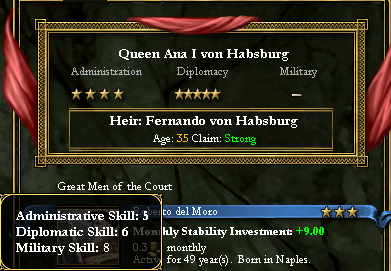

Prussia:
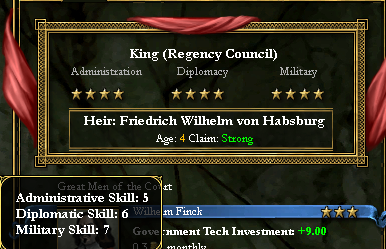

Great Britain:
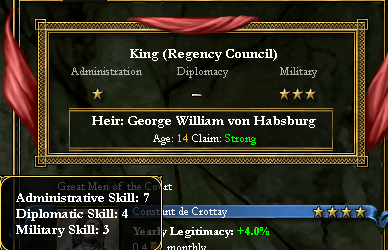
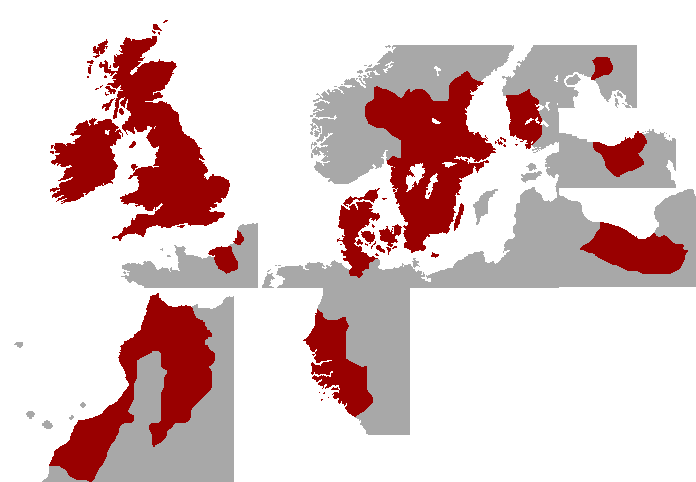
Hungary:
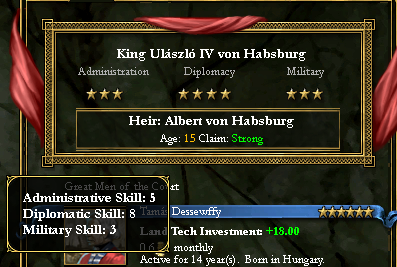

Norway:
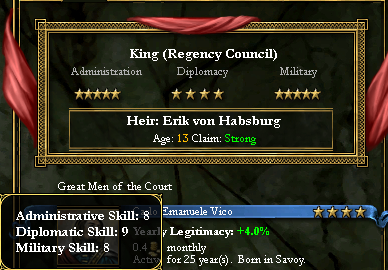

The Rise of the von Habsburgs
Of all the families of Europe none are as famous, nor as powerful, as the von Habsburgs. Originally ailing from a relatively minor duchy inside of the Holy Roman Empire, the von Habsburgs effectively became extinct after the von Oldenburgs took over Austria following a succession crisis. It was at this time when the von Habsburgs began their greatest rise to domination. For some reason lost to history, a son of the von Habsburg family became the heir of the minor duchy of Luxembourg. Two decades after the death of the von Habsburgs, they were resurrected by a man named Johan II von Habsburg. For unknown reasons the Habsburgs quickly expanded into England following the fall of the Lancasters, and later into Spain after the war of Spanish succession in which England enforced a Habsburg heir on the Spanish throne.
Despite this great success, the Habsburgs were no where near finished with their expansion. After a few decades the combined thrones of Spain and England installed a Habsburg upon the throne of Hungary. With that three of the five main powers of Europe were in the hands of the von Habsburgs. Hungary, Spain, and England would constantly be at odds with the Genghisids of the Steppe, but as time went on tensions began to wane between them even if the wars rarely ever ceased. A rift soon formed between England and Spain. They were never truly allies, and once the dynasty had a reason to split, they did. With the that divide, the Habsburgs began expanding in different directions. Spain found itself very much alone without any allies in Europe. Their greatest success was when Portugal adopted a Habsburg upon their throne, but he died childless and with that Portugal was inherited by Spain. Without anywhere to expand diplomatic relations in Christian lands, Spain began consorting with Muslims. Yemen and Spain's vassal Granada remain Spain's von Habsburg's most trusted and longest lasting allies
For England things were an entirely different story, after absorbing Ireland, Denmark, much of Sweden, and Scotland it became known as the United Kingdom of Great Britain, Ireland, Denmark, and Sweden. Not only that, but the United Kingdom maintained close relations with the Habsburgs in Hungary which lead to unending conflicts with the Genghisids. Using the United Kingdom's influence and close proximity, England was able to force Norway into accepting a von Habsburg upon their throne. Also, when the Teutons formed Prussia, England remained the only one more prestigious than them to maintain a royal marriage soon bringing the Habsburgs there as well. The Habsburgs soon spread to even greater distances and farther challenges such as in Lithuania and in Burgundy.
All was not totally well for the von Habsburgs. For instance they could not prevent the rise of the de Valois in Bohemia, nor could they prevent the loss of Luxembourg as a bastion of the von Habsburgs. Many are very upset over the fact that both their place of origin and their place of revival are in the hands of other dynasties. Further many have begun to believe that the Habsburgs have began yet another divide, possibly along the Prussian/Hungary - United Kingdom lines that could possibly occur. Greater challenges also occurred. Lithuania was soon annexed by the Golden Horde ending the von Habsburgs there. Burgundy soon found itself taken over by a pretender rebels. Now, only the largest of the Von Habsburgs remain, and even they are not truly secure. Many of the Habsburgs are in regency councils protecting children even as young as four on the throne of their respective nations. With a divide threatening them, and there being a serious lack of strong characters inside the nations, one wonders how long their position as the dominant family in Europe will last.
Spain:


Prussia:


Great Britain:


Hungary:


Norway:


That really is an alarming amount of Habsburg turf! 
(For the record, I didn't get any spyware warnings, but my Firefox is loaded with security devices - Adblock Plus, Flashblock, WOT, NoScript etc. - so I doubt I would see anything anyway!)
(For the record, I didn't get any spyware warnings, but my Firefox is loaded with security devices - Adblock Plus, Flashblock, WOT, NoScript etc. - so I doubt I would see anything anyway!)

